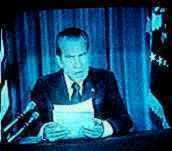Blackwell said he is certain that research somewhere in his files will show that on the night he was elected president, Richard M. Nixon telephoned Wallace Newman, the unsung hero of the editorial and Nixon's acknowledged mentor for life, and asked his advice. With the familiarity the older man always adopted toward Nixon, Newman immediately responded, "'Dickie, don't forget the Indians,'" Blackwell said.
In any case, Nixon "got it" when it came to Indians. He appreciated early on that the dominant theme in Native affairs was tribal, as distinct from civil, rights. Here was something the federal government could do something about under enlightened leadership. The Nixon administration, relying on the copious collaboration of tribes and Indian advisers, provided it in abundance. Not only did Nixon's "Special Message to the Congress on Indian Affairs" of July 8, 1970, launch the federal policy of tribal self-determination with a momentum lasting at least 30 years. It also recognized an end to termination as overt federal policy.


No comments:
Post a Comment